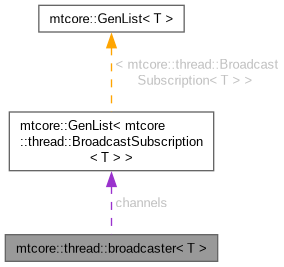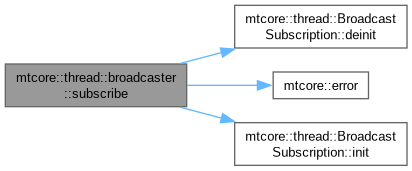A broadcaster is able to send messages to multiple channels, with each channel having its own lock Sending messages requires locking the entire broadcaster. More...
#include <broadcaster.hpp>

Public Member Functions | |
| Result< void, AllocationError > | init (Allocator &alloc, size_t initCapacity=64) |
| Initializes a broadcaster. | |
| Result< void, ChannelSendBlockErrors > | send_block (Allocator &alloc, const T &msg) |
| Blocks while sending data. | |
| Result< BroadcastSubscription< T >, BroadcastSubscribeError > | subscribe (Allocator &alloc) |
| Subscribes to a broadcaster Will create a new inbox for the subscription. | |
| void | close () |
| Closes the broadcaster which prevents messages from being sent (which aren't already being sent) and it also prevents new subscriptions from being created It will also close all existing subscriptions, which can result in partial writes (e.g. | |
| void | deinit (Allocator &alloc) |
| Will close the broadcaster and will also clean up the broadcaster's references to each subscription (a single Arc.release()) Will also close any subscriptions that didn't get cleaned up. | |
Public Attributes | |
| GenList< BroadcastSubscription< T > > | channels |
| std::mutex | mux |
| bool | closed = false |
Detailed Description
struct mtcore::thread::broadcaster< T >
A broadcaster is able to send messages to multiple channels, with each channel having its own lock Sending messages requires locking the entire broadcaster.
However, reading messages allows for many separate locks. This makes it ideal for scenarios with one publisher and many subscribers.
Note that there is less insight into the state of each channel as they are locked separately. Because of this, only blocking sends and blocking receives are allowed, as acquiring the lock and waiting is the only way to really prevent partial sends.
So, while we should have better read throughput than the Publisher/Subscription flow, we have less flexibility in the API and only have blocking operations. This also means we cannot use Broadcaster with select()
Locks:
- 1 lock for entire structure
- 1 lock per channel
Atomic Reference Counting:
- 1 per channel
Condition Variables:
- 2 condition variables per channel
Non-Blocking Availability:
- None
Known Race Conditions (aka. designed in):
- If a send is started, the broadcaster may get closed or denitialized
- Planned Behavior: Channels will get closed and may prevent the send from completing successfully. The send may fail and enter a partial send state
- Template Parameters
-
T Message Type
Definition at line 103 of file broadcaster.hpp.
Member Function Documentation
◆ close()
|
inline |
Closes the broadcaster which prevents messages from being sent (which aren't already being sent) and it also prevents new subscriptions from being created It will also close all existing subscriptions, which can result in partial writes (e.g.
a message is blocked after sending to half of the subscriptions)
Definition at line 201 of file broadcaster.hpp.
◆ deinit()
|
inline |
Will close the broadcaster and will also clean up the broadcaster's references to each subscription (a single Arc.release()) Will also close any subscriptions that didn't get cleaned up.
- Parameters
-
alloc Allocator to free memory with
Definition at line 219 of file broadcaster.hpp.

◆ init()
|
inline |
Initializes a broadcaster.
- Parameters
-
alloc Allocator for allocating memory initCapacity Initial capacity
- Returns
Definition at line 114 of file broadcaster.hpp.
◆ send_block()
|
inline |
Blocks while sending data.
Will grow inboxes as needed, and will free closed subscriptions as needed
- Parameters
-
alloc Allocator to use for growing and closing msg Message to send
- Returns
- Errors if they happened
Definition at line 124 of file broadcaster.hpp.

◆ subscribe()
|
inline |
Subscribes to a broadcaster Will create a new inbox for the subscription.
- Parameters
-
alloc Allocator to use for creating the subscription
- Returns
- the subscription on success or an error on failure
Definition at line 168 of file broadcaster.hpp.

Member Data Documentation
◆ channels
| GenList<BroadcastSubscription<T> > mtcore::thread::broadcaster< T >::channels |
Definition at line 104 of file broadcaster.hpp.
◆ closed
| bool mtcore::thread::broadcaster< T >::closed = false |
Definition at line 106 of file broadcaster.hpp.
◆ mux
| std::mutex mtcore::thread::broadcaster< T >::mux |
Definition at line 105 of file broadcaster.hpp.
The documentation for this struct was generated from the following file: